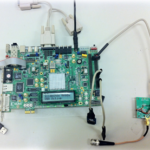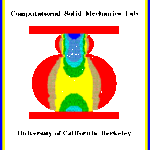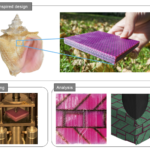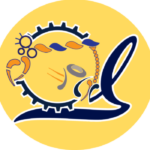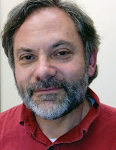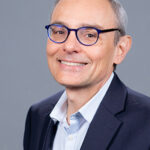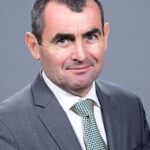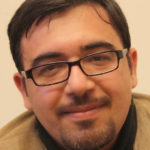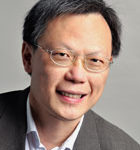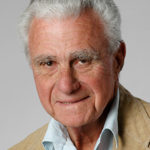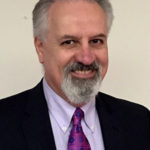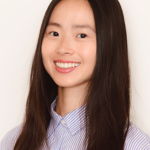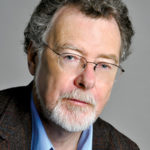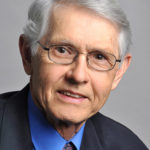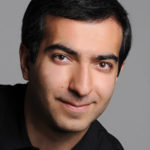The CML was founded in January 1989 after several years of close collaborative research between the department’s faculty members and the computer industry. It consists of several major laboratories in such fields as Servo Control, Tribology, Dynamics and Instrumentation. CML is one of the leading research laboratories in ME dealing with the mechanics of sensitive …
Research Interest
Computational Solid Mechanical Laboratory
CSML was founded in 1992 and curates research in the area of computational solid mechanics. It employs several graduate students, post-doctoral fellows, and other research visitors. CSML is co-located with the research groups of Professors Fai Ma and Stephen Morris.
Dynamics Lab
Our research focuses on the dynamics of mechanical systems and frequently draws upon rigid body dynamics, continuum mechanics, robotics, and biology. Current interests include discrete elastic rods, the dynamics of flexible risers, models for soft robot locomotion, and fluid-structure interaction. We use a combined analytical, computational, and experimental approach with the goal of elucidating the …
Gu Research Group
The Gu Research Group works at the intersection of mechanics, additive manufacturing, materials, and computer science. We aim to make additive manufacturing more accessible, economical, and ubiquitous. Using a bioinspired algorithmic-driven design approach, we harness tools such as advanced computational analysis, machine learning, and topology optimization to expand and revolutionize the field of smart additive manufacturing …
Molecular Cell Biomechanics Laboratory
Mofrad Lab combines the state-of-the-art molecular and multiscale biomechanics, computational biology and bioinformatics, and statistical machine learning approaches toward understanding and diagnosis of human diseases.
David Steigmann
Professor of Mechanical Engineering
6133 Etcheverry HallUniversity of California, Berkeley
Berkeley, CA 94720-1740
dsteigmann@berkeley.edu
(510) 643-3165
For more information see: Current Classes Taught
To view Professor Steigmann’s CV, please click here.
Research Description:
Continuum, mechanics, shell theory, finite elasticity, variational methods, stability, surface stress, capillary phenomena, mechanics of thin films.
Key Publications:
To view a list of Professor Steigmann’s publications, please click here.
Panayiotis Papadopoulos
Byron and Elvira Nishkian Chair in Structural Engineering
Distinguished Professor of Mechanical Engineering
Byron and Elvira Nishkian Chair in Structural Engineering
Director of CoE Aerospace Engineering Programs
University of California, Berkeley
Berkeley, CA 94720-1740
panos@berkeley.edu
(510) 642-3358
For more information see: Computational Solid Mechanics Lab
Current Classes Taught
RELATED EXPERIENCE
7/1/04 – present : Professor, University of California, Berkeley
7/1/98 – 6/30/04 : Associate Professor, University of California, Berkeley
7/1/92 – 6/30/98 : Assistant Professor, University of California, Berkeley
1/1/92 – 6/30/92 : Post-Doctoral Researcher, University of California, Berkeley
8/1/91 – 12/31/91 : University Lecturer, University of California, Berkeley
1/1/88 – 8/31/91 : Graduate Research Assistant, University of California, Berkeley
8/1/87 – 5/31/90 : Graduate Student Instructor, University of California, Berkeley
UNIVERSITY DEGREES
Ph.D. Civil Engineering, University of California, Berkeley, December 1991
M.S. Civil Engineering, University of California, Berkeley, May 1987
Dipl. Civil Engineering, Aristotle University, Thessaloniki, Greece, July 1986
Research Description:
Computational mechanics, solid mechanics, biomechanics, applied mathematics
Key Publications:
To view a list of Professor Professor Papadopoulos’ publications, please visit the Computational Solid Mechanics Lab website.
Oliver M. O’Reilly
Distinguished Professor of Mechanical Engineering
Vice Provost for Undergraduate Education
University of California, Berkeley
Berkeley, CA 94720-1740
oreilly@berkeley.edu
(510) 642-0877
For more information see: Dynamics Lab
Current Classes Taught
Oliver M. O’Reilly is the Vice Provost for Undergraduate Education, the Faculty Athletics Representative, and a Distinguished Professor of Mechanical Engineering at the University of California at Berkeley
He received his B.E. in Mechanical Engineering from the National University of Ireland, Galway (NUIG). Subsequently, he received his M.S. and Ph.D. degrees in Theoretical and Applied Mechanics from Cornell University. At Cornell, he studied under Phil Holmes and Frank Moon. After spending two years as a postdoc at the Institut für Mechanik at ETH-Zürich under Jürg Dual, he joined the faculty in Mechanical Engineering at Cal in 1992. He has previously served as the Chair and Vice Chair of the Berkeley Division of the Academic Senate and as an Associate Dean for Graduate Education in the Division of Computing, Data Science, and Society.
His interests span the fields of continuum mechanics and nonlinear dynamics. He has a broad range of specializations including directed (or Cosserat) theories of deformable bodies, constrained rigid body dynamics, contact mechanics, linear and nonlinear vibrations and linear and nonlinear dynamics of deformable bodies. He has applied these interests to a range of applications including soft robots, MEMS resonators, brake squeal, the dynamics of toys, motorcycle navigation, axially moving media, artificial and natural satellites, spinal kinematics and vehicle collision dynamics.
O’Reilly has coauthored over 100 archival journal articles, written three textbooks, coauthored a monograph, and is a co-inventor on two patents. He has also received multiple teaching awards including U.C. Berkeley’s Distinguished Teaching Award in 1999, the Pi-Tau-Sigma Professor of the Year Award in 2003 and the Tau-Beta-Pi Outstanding Faculty of the Year Award in 2013. He is also a recent recipient of the Berkeley Faculty Service Award.
To view Professor O’Reilly’s CV, please click here.
Research Description:
Dynamics, Vibrations, Continuum Mechanics
Key Publications:
To view a list of Professor O’Reilly’s publications, please visit the Dynamics Lab website.
Mohammad R. K. Mofrad
Professor of Mechanical Engineering and Bioengineering
208A Stanley Hall #1762University of California, Berkeley
Berkeley, CA 94720-1762
mofrad@berkeley.edu
(510) 643-8165
For more information see: Molecular Cell Biomechanics Laboratory
Current Classes Taught
Education
1991 B.A.Sc., Sharif University of Technology
1994 M.A.Sc., University of Waterloo
1999 Ph.D., University of Toronto
Professional Experience
1999 – 2000 Post-Doc, Computer Science Department, University of Toronto
2000 – 2002 Post-Doc, MIT and Harvard Medical School/Mass. General Hospital
2002 – 2004 Principal Research Scientist, Biological and Mechanical Engineering, MIT
2005 – 2010 Assistant Professor, Department of Bioengineering, University of California, Berkeley
2010 – 2013 Associate Professor, Department of Bioengineering, University of California, Berkeley
2011 Visiting Professor, Department of Bioengineering, EPFL, Lausanne, Switzerland
2012 – 2013 Associate Professor, Department of Mechanical Engineering, University of California, Berkeley
2012 – Present Faculty Scientist, Molecular Biophysics, Lawrence Berkeley National Lab
2012 – 2014 Faculty Director, UC Berkeley Master of Bioengineering (M.Eng) Program
2013 – Present Professor, Departments of Bioengineering and Mechanical Engineering, University of California, Berkeley
2014 – 2015 Faculty Co-Director, Berkeley-UCSF Master of Translational Medicine (MTM) Program
Research Description:
Multiscale Biomechanics of Cardiovascular Disease and Brain Injury; Molecular and Cellular Mechanobiology; Mechanics of Integrin-Mediated Focal Adhesions; Mechanics of the Nuclear Pore and Nucleocytoplasmic Transport
Key Publications:
To view a list of Professor Mofrad’s publications, please visit the Molecular Cell Biomechanics Laboratory website and PubMed.
Fai Ma
Professor of Applied Mechanics
6127 Etcheverry HallUniversity of California, Berkeley
Berkeley, CA 94720-1740
fma@berkeley.edu
(510) 643-6527
For more information see: Current Classes Taught
To view Professor Ma’s CV, please click here.
Research Description:
Dynamical Systems with Inherent Uncertainties, Vibration, Damping and Hysteresis
Key Publications:
To view a list of Professor Ma’s publications, please click here.
George Leitmann
Professor Emeritus of Mechanical Engineering
Professor Emeritus of Engineering Science
University of California, Berkeley
Berkeley, CA 94720-1700
gleit@berkeley.edu
(510) 642-3984
For more information see:
To view Professor Leitmann’s CV, please click here.
Research Description:
Economics, planning, dynamics systems, control theory, optimal control, dynamic games, & robust control, applications engineering, mechanical systems, business administrations, biological systems
Key Publications:
To view a list of Professor Leitmann’s publications, please click here.
Kyriakos Komvopoulos
Distinguished Professor of Mechanical Engineering
5143 Etcheverry HallUniversity of California, Berkeley
Berkeley, CA 94720-1740
kyriakos@me.berkeley.edu
(510) 642-2563
For more information see: Current Classes Taught
Research Description:
Theoretical and numerical studies in nano/microscale contact mechanics, tribology, mechanical behavior of thin-film structures, deposition and characterization of ultrathin films by sputtering and filtered cathodic vacuum arc methods, stress analysis, fracture, and adhesion of dynamic microdevices, plasma-assisted surface modification of biopolymers, surface chemical functionalization for enhanced biocompatibility and cell activity, mechanotransduction effects at the single-cell and tissue levels, and electrospun fibrous scaffolds for tissue engineering.
To learn more about Professor Komvopoulos’ research, please click here.
To view a list of Professor Komvopoulos’ supervised current and past graduate students and visiting scholars, please click here.
To view a biographical sketch of Professor Komvopoulos, please click here.
To view the content of courses taught by Professor Komvopoulos, please click here.
Key Publications:
To view a list of Professor Komvopoulos’ publications, please click here.
Grace X. Gu
Assistant Professor of Mechanical Engineering
6177 Etcheverry HallUniversity of California, Berkeley
Berkeley, CA 94720-1740
ggu@berkeley.edu
(510) 643-4996
For more information see: Gu Research Group
Current Classes Taught
Education:
PhD Mechanical Engineering, MIT, 2018
MS Mechanical Engineering, MIT, 2014
BS Mechanical Engineering, University of Michigan, 2012
Research Description:
Research interests: Composites, additive manufacturing, fracture mechanics, topology optimization, machine learning, finite element analysis, and bioinspired materials.
Key Publications:
S Lee, Z Zhang, and GX Gu. Deep learning accelerated design of mechanically efficient architected materials, ACS Applied Materials & Interfaces, 2023
B Zheng, Z Jin, G Hu, J Gu, SY Yu, JH Lee, and GX Gu. Machine learning and experiments: A synergy for the development of functional materials, MRS Bulletin, 2023
S Lee, D Lim, E Pegg, and GX Gu. The origin of high-velocity impact response and damage mechanisms for bioinspired composites, Cell Reports Physical Science, 2022
JH Lee, Z Zhang, and GX Gu. Maximum electro-momentum coupling in piezoelectric metamaterial scatterers, Journal of Applied Physics, 2022
Z Zhang, Z Jin, and GX Gu. Efficient pneumatic actuation modeling using hybrid physics-based and data-driven framework, Cell Reports Physical Science, 2022
S Lee, Z Zhang, and GX Gu. Generative machine learning algorithm for lattice structures with superior mechanical properties, Materials Horizons, 2022
Z Jin, Z Zhang, K Demir, and GX Gu. Machine learning for advanced additive manufacturing, Matter, 2020
B Zheng and GX Gu. Machine learning-based detection of graphene defects with atomic precision, Nano-Micro Letters, 2020
C Yang, Y Kim, S Ryu, and GX Gu. Prediction of composite microstructure stress-strain curves using convolutional neural networks, Materials & Design, 2020
Z Zhang, K Demir, and GX Gu. Developments in 4D-printing: A review on current smart materials, technologies, and applications, International Journal of Smart and Nano Materials, 2019
To view a complete list of Professor Gu’s publications, please visit the Gu Research Group website.
James Casey
Professor of Mechanical Engineering
6125 Etcheverry Hall, Mailstop 1740University of California, Berkeley
Berkeley, CA 94720-1740
jimcasey@berkeley.edu
(510) 642-2863
For more information see: Current Classes Taught
Research Description:
Continuum mechanics, plasticity, approximate nonlinear theories of elasticity, dynamics of nearly rigid bodies.
Key Publications:
To view a list of Professor Casey’s publications, please click here.
David B. Bogy
Professor of Mechanical Engineering
Director, Computer Mechanics Laboratory
Professor of the Graduate School
Director, Computer Mechanics Laboratory
University of California, Berkeley
Berkeley, CA 94720-1740
dbogy@berkeley.edu
(510) 642-2570
For more information see: Computer Mechanics Lab
Current Classes Taught
Research Description:
Mechanics in computer technology: tribology in hard-disk drives, laser measurement systems, numerical simulations. Static and dynamic problems in solid and fluid mechanics.
M. Reza Alam
American Bureau of Shipping Chair in Ocean Engineering
Vice Chair, Equity & Inclusion
Professor of Mechanical Engineering
American Bureau of Shipping Chair in Ocean Engineering
University of California, Berkeley
Berkeley, CA 94720-1740
reza.alam@berkeley.edu
(510) 643-2591
For more information see: TAF Lab
Current Classes Taught
Born in Yazd, a small historic city at the geographic center of Iran, Reza received his BSc in Mechanical Engineering and MSc in Applied Mechanics from Sharif University of Technology, Tehran, Iran. He then joined the Mechanical Engineering program at Massachusetts Institute of Technology, Cambridge, MA. He received his Master of Science in Mechanical Engineering in 2005, Ph.D. in Mechanical Engineering in 2008, and then served as a Postdoctoral associate (2008-2009) and Lecturer (2009-2011) at MIT. In July 2011 Reza joined the faculty of the University of California, Berkeley, CA, as an Assistant Professor of Mechanical Engineering.
Research Description:
Theoretical Fluid Dynamics, Nonlinear Wave Mechanics, Ocean and Coastal Waves Phenomena, Ocean Renewable Energy (Wave, Tide and Offshore Wind Energy), Nonlinear Dynamical Systems, Fluid Flow Control
Key Publications:
Publications in 2015
Jalali, M. A.; Khoshnood, A., and Alam, M.-R., “Microswimmer-Induced Chaotic Mixing“, Journal of Fluid Mechanics (2015), In Press, [PDF]
Zareei, A. and Alam M.-R., “Cloaking in Shallow Water Waves via Nonlinear Medium Transformation“, Journal of Fluid Mechanics (2015), Volume 778, pp. 273-287
Timmerberg, S, Börner, T., Shakeri, M., Ghorbani, R. and Alam M.-R., “The “Wave Bridge” For Bypassing Oceanic Wave Momentum“, Journal of Ocean Engineering and Marine Energy (2015), [PDF]
Couston, L. A., Mei, C. C., and Alam, M.-R. “Landslide Tsunamis in Lakes“, Journal of Fluid Mechanics, Volume 772 / June 2015, pp 784- 804. [PDF]
Nia, H. T., Jain, A. D., Liu, Y., Alam, M.-R., Barnas, R., and Makris N.C., “The evolution of air resonance power efficiency in the violin and its ancestors“ Proceedings of the Royal Society A: Mathematical, Physical & Engineering Sciences, A 471: 20140905. (2015). [PDF]
Börner, T., and Alam, M.-R. “Real Time Hybrid Modeling for Ocean Wave Energy Converters“, Renewable & Sustainable Energy Reviews, Vol. 43, pages 784–795, (2015).
Please visit the TAF Lab website for the previous years’ publications.


